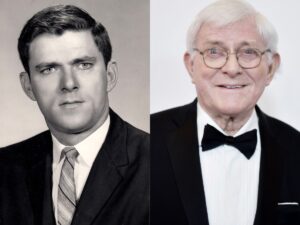At the age of 88, Phil Donahue, who was regarded by many as the “king of daytime talk,” passed suddenly. Following a protracted illness, his family revealed that he passed away quietly at home on Sunday, surrounded by loved ones. As one of the most important people in television history, Donahue is remembered for his revolutionary chat show The Phil Donahue Show, which revolutionized the daytime television genre.
While working as a radio presenter and news anchor in the late 1950s, Donahue’s major break came in 1967 when he started his own program in Dayton, Ohio. Donahue’s unique structure and willingness to address social concerns that other programs shied away from helped turn what began as a regional experiment into a national sensation very quickly. His ability to engage viewers made him a trailblazer, and The Phil Donahue Show came to be associated with candid, open dialogue on a wide range of subjects, from politics and war to feminism and civil rights.

Donahue’s introduction of audience interaction was one of his most important contributions to the talk show format. After relocating the program to Chicago in 1974, he started include live audiences in the discussion so that viewers could interact with the speakers in real time in addition to witnessing them.
This format turned into a signature of his program and paved the way for other talk programs to imitate his approach in the future. Over the course of its nearly three-decade run, The Phil Donahue Show produced over 6,000 episodes and conducted interviews with some of the most well-known people of the day, such as Dolly Parton, Muhammad Ali, and Nelson Mandela.

Donahue was renowned for providing voice to underrepresented groups and subjects. In a media industry that was usually more cautious, he pushed boundaries by inviting guests from across the political spectrum and taking on contentious themes head-on.
His ability to create thought-provoking conversations won him a devoted audience, especially from women who valued the focus of his show on subjects that related to their own experiences and lives. His show changed the perception of what daytime television could be by providing a forum for the marginalized.

Donahue was a committed family man in addition to his professional accomplishments. Marlo Thomas, an actress he married in 1980, and their four children are his only surviving relatives. They were well-known as a pair in Hollywood for their humanitarian giving and advocacy. Many honors, such as 20 Daytime Emmy Awards and the distinction of being elected into the Academy of Television Arts & Sciences Hall of Fame, were bestowed to Donahue for his services to television.

The influence of Phil Donahue on television is immense. He was a trailblazer who defied convention by transforming daytime programming from a venue for light entertainment to one for serious discussion and social change. His bravery in taking on subjects that others were afraid to touch changed television history forever, making him a trailblazer whose impact is still felt to this day.

As the world bids adieu to an icon, Donahue’s legacy will live on because of the many people he impacted and the lasting impact of his contributions. His contributions to television will be remembered for many years to come because of his extraordinary ability to combine entertainment with social insight.
